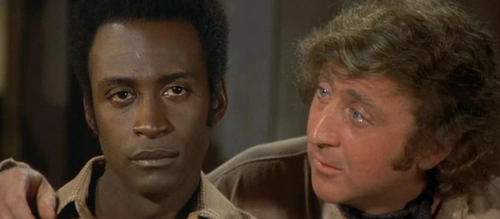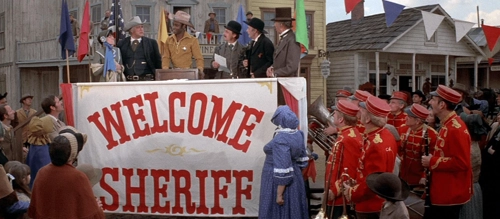‘Blazing Saddles’ at 50 – Review

Blazing Saddles (1974)
Director: Mel Brooks
Screeenwriters: Mel Brooks, Norman Steinberg, Andrew Bergman, Richard Pryor, Alan Uger
Starring: Cleavon Little, Gene Wilder, Harvey Korman, Madeline Kahn, Slim Pickens, Mel Brooks, Burton Gilliam, Alex Karras, David Huddleston, Liam Dunn, John Hillerman, George Furth, Jack Starrett, Carol Arthur, Richard Collier, Robyn Hilton, Dom DeLuise
“They could never make Blazing Saddles today” is what they say. It’s probably one of the Film Twitter views among many, many bad takes most indicative of the death of media literacy. Now Mel Brooks’ Western spoof classic is turning 50 years old, what better time to look back on its seismic impact over the past half century?
The citizens of the sleepy town of Rock Ridge are victim of a dastardly conspiracy masterminded by Attorney General Hedy Lamarr (it’s Hedley!) to scare them off and make way for the railroad. After being raided by outlaws hired by Lamarr (Harvey Korman), the townspeople’s pleas for a new sheriff results in the hiring of Black railroad worker Bart (Cleavon Little) to stoke further tension. Bart has an uphill battle and must team up with Jim, the Waco Kid (Gene Wilder), and bring the townspeople on side to defend their home and their way of life.
Brooks scored a real coup by getting renowned Western theme song singer Frankie Laine to belt out his parody, punctuated by exaggerated whip-cracks over the opening credits: “He rode a blazing saddle. / He wore a shining star. / His job to offer battle / To bad men near and far”. This helps set the tone for the whole thing; lovingly crafting every one of the well-worn genre tropes that it apes, making it all look enough like a serious take on the same material until it is pushed just that bit further into the realm of parody.
That’s what makes Brooks such an accomplished creator of film spoofs – his love and affection for whatever he is making fun of, whether his target is Broadway (The Producers), Universal Horror movies (Young Frankenstein) or America’s favourite genre in Blazing Saddles. It’s not the Scary Movie guys lazily recreating an iconic movie moment and adding someone getting kicked in the nuts, it’s much more than that.
Let us dig into the common criticism that because Blazing Saddles features frequent racial slurs it must be a racist movie. To borrow a phrase, that’s horse shit. This isn’t something that has aged poorly, from a different time with less enlightened views like Mickey Rooney playing a Japanese stereotype in Breakfast at Tiffany’s or hiring white extras in blackface to play African tribesmen in early monster movies. The script (tellingly with Richard Pryor among the writing team) repeatedly using the N-word here has a purpose; to hold a mirror up to everyday prejudice prevalent in American society. We’re not laughing that so many white guys are saying it, but that they’re looking down on the people they are using the slur to dehumanise despite the fact that the Black characters are all (but especially Sheriff Bart) much smarter, more self-aware and skilled than anyone trying to put them down.
At one point you think Brooks is going to give the outdated view of some rural communities a pass, shrugging that ignorance thrives and never really leaves places closed off to the rest of the world, before Jim follows up with the punchline of his (and Brooks’) social assessment: “You’ve got to remember that these are just simple farmers. These are people of the land. The common clay of the new West. You know… morons.”

Blazing Saddles has several infamous, revolutionary comedy set pieces, from the bad guy posse’s chorus of bean-fuelled farting around the campfire to the slapstick-heavy raid on Rock Ridge’s citizens (all called Johnson) to the recruitment drive made up of goons from various anachronistic film genres gathering to carry out Lamarr’s evil purpose: “Men, you are about to embark on a great crusade to stamp out runaway decency in the west. Now you men will only be risking your lives, whilst I will be risking an almost certain Academy Award nomination for Best Supporting Actor.” Then there’s the genre itself breaking (along with the fourth wall) in the film’s rapidly escalating final act in a sequence that has to be seen to be believed. Perhaps the best of all is Madeline Kahn as Marlene Dietrich-riffing saloon singer Lily Von Schtupp’s innuendo-laden performance: “I’ve been with thousands of men/again and again/they promise the moon/they’re always coming and going and going and coming… and always too soon.” Kahn was always the funniest thing in everything she was in, and it takes real skill for someone who can actually sing to sing so badly.
If Cleavon Little’s Bart is the charming, sexy and straight-shooting hero and his journey to acceptance quite rightly the central emotional focus of the picture, then Gene Wilder’s Jim and his overcoming of this many demons is the dark heart of it. Wilder’s wryness and the ever-present sadness behind his eyes is always a joy to behold: “Well, my name is Jim, but most people call me… Jim.” Wilder gets one of the great comedy monologues explaining what caused him to give up the life of a gunslinger and retreat into alcoholism, beginning “I must have killed more men than Cecil B. DeMille” and ending with a superb subversion-busting punchline.
Being a Warner Brothers production, you of course had to get a Looney Tunes gag or two in there, with several characters given comedy speech impediments and Bart defeating the formidable brute Mongo (Alex Karras) with a Bugs Bunny classic strategy (“Telegram for Mongo!”). It’s these injections of childish silliness into proceedings that keeps things light, that remind you that while Brooks has a few serious points to make, he’s here to make sure we’re having a good time at the movies as well.
Even Brooks occasionally misjudges his comedy and couldn’t resist appearing not only as the buffoonish corrupt Governor Lepetomane but also as an Indian Chief in a flashback scene, all to set up a not particularly good joke. His quite homophobic gags also seem to be punching down without clear purpose, unlike his skewering of racism, and can very much be filed under “unfortunate product of their time”.
Despite a lack of faith from its studio and some contrarian voices on its initial release, Blazing Saddles is rightly considered one of the funniest studio comedies ever made. The gag rate from the clever to the crude is exceptionally high, and we’re given great performances from a talented ensemble who all knew the assignment, while the film also bravely and cleverly deconstructs one of the foundational genres Hollywood was built on while lambasting widespread prejudice. Brooks also inadvertently, along with more intentional and serious takes like Sidney Poitier’s Buck and the Preacher, predicted a string of revisionist Westerns to come over the next five decades. From Posse to Django Unchained and The Harder They Fall, films that acknowledge the American Frontier wasn’t morally black-and-white or racially all-White. So don’t be a provincial putz, it’s still OK to laugh at Blazing Saddles as long as you get what the joke is.
Score: 22/24

